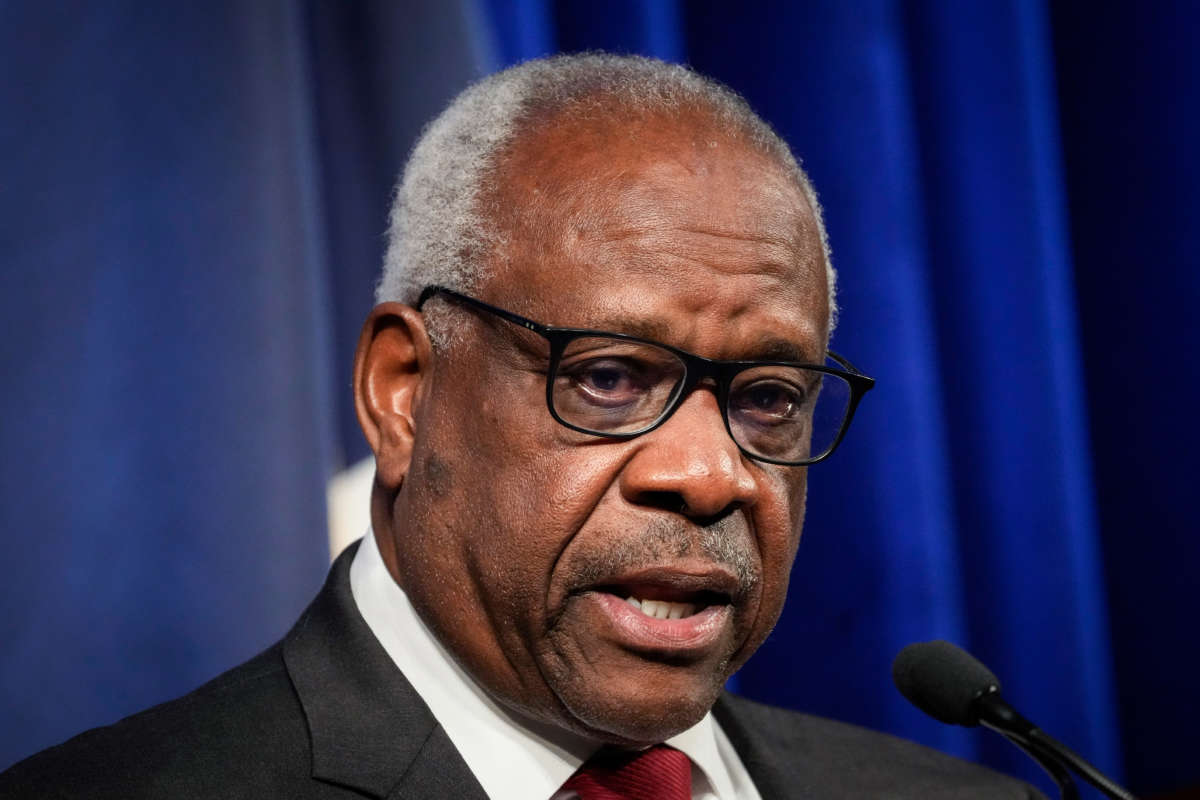Amid controversy surrounding Supreme Court Justice Clarence Thomas’s personal ties to the January 6 attack on the Capitol, new polling finds that the vast majority of likely voters support implementing a stronger code of ethics for the High Court.
When asked whether or not they agreed that Supreme Court justices should be subject to a code of ethics requiring them to recuse themselves from any case relating to personal financial or family matters, 81 percent of 1,177 respondents agreed, new polling by Data for Progress finds. Only 10 percent of respondents were opposed to the proposal, giving the supporters a 71-point margin.
Support held strong across political affiliations. Democrats were the most supportive of the code of ethics, with 84 percent in favor. An overwhelming majority of independents and Republicans also agreed with the idea, with 82 percent and 77 percent of respondents saying as such, respectively.
The polling comes as Democratic and progressive lawmakers and government watchdog groups are calling for Thomas to recuse himself from cases related to the 2020 election and Donald Trump’s coup attempt on January 6th, 2021. Last month, Rep. Alexandria Ocasio-Cortez (D-New York) called for Thomas to recuse himself from such cases and to disclose his family’s income gathered from far right organizations — or, better yet, to resign, she said.
These calls were sparked by recent revelations that Thomas’s wife, conservative activist Ginni Thomas, was deeply involved in efforts to keep Trump in the White House after the former president’s loss to Joe Biden. In leaked texts between Ginni Thomas and Trump’s chief of staff, Mark Meadows, she appeared to be using her close ties with federal officials in order to push them to overturn the election results.
Thomas’s financial ties to the right wing have also come into question. In 2011, government watchdog group Common Cause discovered that Clarence Thomas had failed to report that, over the course of 2003 to 2007, Ginni Thomas had received $680,000 from the Koch-funded Heritage Foundation. Clarence Thomas later amended his financial statements to reflect that information.
The existing code of conduct for members of the Supreme Court requires justices to recuse themselves from cases that may relate to their personal finances, but doesn’t specifically bar them from cases that they have personal ties to, outside of financial issues.
Legal ethics experts say that Thomas’s personal ties make enough of a case for him to recuse himself from all 2020 election-related cases. Voters agree with this; polling from earlier this month found that 53 percent of voters think that Thomas shouldn’t participate in cases involving his wife. The same poll, by Politico/Morning Consult, found that only 28 percent of Americans approve of Thomas.
The issue with Thomas’s participation in 2020 election-related cases is not only the rulings themselves, experts say, but also that it may shake the public’s trust in the Court overall.
The public view of the Supreme Court in general has been eroding as conservatives have manipulated the Court in their favor. A poll last year found that less than 50 percent of Americans approve of the Supreme Court’s performance, the lowest approval rating in five years.
Join us in defending the truth before it’s too late
The future of independent journalism is uncertain, and the consequences of losing it are too grave to ignore. To ensure Truthout remains safe, strong, and free, we need to raise $43,000 in the next 6 days. Every dollar raised goes directly toward the costs of producing news you can trust.
Please give what you can — because by supporting us with a tax-deductible donation, you’re not just preserving a source of news, you’re helping to safeguard what’s left of our democracy.
